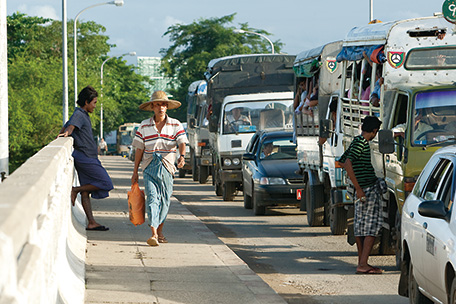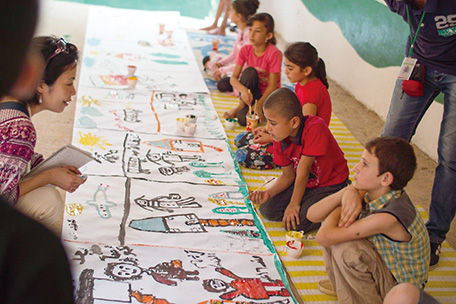Section 3 Operational Status of the Principle of Assistance Implementation
Japan's ODA is provided in accordance with the aid principles embodied by the Official Development Assistance (ODA) Charter (replaced in February 2015 by the Development Cooperation Charter). In doing so, the Japanese government takes a holistic approach by considering such factors as the needs, socio-economic conditions, and possible impact on the people in socially vulnerable situations in the recipient countries, as well as Japan's bilateral relations with these countries, keeping in line with the principles of the Charter of the United Nations (especially those concerning sovereign equality and non-intervention in domestic matters) as well as the following considerations:
- Environmental conservation and development should be pursued in tandem.
- Any use of ODA for military purposes, or for aggravation of international conflicts, should be avoided.
- Full attention should be paid to trends in recipient countries' military expenditures, their development and production of weapons of mass destruction and missiles, and their export and import of arms, etc., so as to maintain and strengthen international peace and stability, including the prevention of terrorism and the proliferation of weapons of mass destruction, with the understanding that developing countries should place appropriate priorities in the allocation of their resources on their own economic and social development.
- Full attention should be paid to efforts for promoting democratization and the introduction of a market-oriented economy, and the situation regarding the protection of basic human rights and freedoms in the recipient country.
| Environmental and Social Considerations
In promoting economic development, the burden on the environment and the impact on the local communities should be taken into account. Japan utilizes its experience of industrial pollution, including Minamata disease to implement ODA carefully, in order to avoid and minimize adverse impact on the environment. Japan also gives consideration to ensuring that its development policies do not have undesirable impact on local societies, in particular, on those who can easily become socially vulnerable, such as the poor, women, ethnic minorities, and persons with disabilities. For example, JICA updated its “JICA guidelines for environmental and social considerations” in April 2010. JICA follows the guidelines to ensure that due consideration is given to environmental and social factors in its preliminary studies, environmental reviews, and monitoring at the implementation stage.
Also, Japan implements a policy of incorporating gender perspectives at all stages of projects—including policy formulation, planning, implementation, and evaluation—in order to promote “gender mainstreaming in development.”
| Avoidance of Any Use of Development Cooperation for Military Purposes or for Aggravation of International Conflicts
The Japanese government adheres to the ODA principle of “avoidance of any use of development cooperation for military purposes or for aggravation of international conflicts,” and does not provide assistance for military purposes using ODA. Japan proactively contributes to counter-terrorism and peacebuilding, but in order to prevent aid supplies and funds provided by Japan from being used for military purposes, Japan ensures that sufficient attention is given to this principle even when ODA is used to its goals including counter-terrorism.
| Measures to Promote Democratization and Ensure Basic Human Rights and Freedom
When changes of government take place as a result of political turmoil in developing countries, the democratic legitimacy of nascent regimes could be questioned. Whereas the constitution of a country should serve as the guarantor of basic human rights, there have been cases where constitutions are suspended at times of political turbulence in developing countries. Various forms of violation of basic human rights could become a source of concern, including cases of crack down on anti-government protests in developing countries. When such concerns are identified, the Japanese government takes every step to ensure that its ODA is used adequately. The Government of Japan therefore takes a cautious approach in its provision of ODA, leaving no room for the governments of recipient countries to doubt Japan's strong interest in democracy and human rights.
The new Development Cooperation Charter reaffirms those basic principles pertaining to ODA implementation contained in the previous ODA Charter, while spelling out in more detail how to promote the effctiveness and efficiency of Japan's development cooperation. With a view to securing the appropriateness of Japan's development cooperation, these principles concerning the prevention of fraud and corruption, as well as the security and safety of personnel, were added in the new Charter. Japan's development cooperation will be conducted in accordance with these principles.
Myanmar

The Thuwunna Bridge in Myanmar, which was built in 1985 through support from Japan. It is now an important transportation route for the citizens. (Photo: Shinichi Kuno / JICA)
In order to support Myanmar's efforts for reforms in various areas towards its democratization, national reconciliation and sustainable economic development, Japan extends wide-ranging support, while continuously observing the progress of these efforts in such a way that a wide range of people can enjoy the “dividend” of democratic reforms. In doing so, Japan's support focuses on the following areas:
- Improvement of people's livelihoods (including assistance for ethnic minorities and poverty groups as well as agricultural and rural development)
- Capacity building and institutions development to sustain the economy and society (including assistance for promotion of democratization)
- Development of infrastructure and related systems necessary for sustainable economic growth
Based on this policy, Prime Minister Shinzo Abe, during his visit to Myanmar in May 2013, expressed that the public and private sectors of Japan would together extend full support for the reform being conducted by the Government of Myanmar. Prime Minister Abe announced Japan's intention to provide assistance worth ¥91 billion (¥51 billion as ODA loans as well as ¥40 billion as grant aid and technical cooperation) to Myanmar by the end of FY2013. This commitment was achieved by the end of FY2013. Additionally, Prime Minister Abe announced the provision of a new ODA loan of approximately ¥63.2 billion at the Japan-Myanmar Summit Meeting in December 2013. Japan has furthermore announced its intention to provide an ODA loan of approximately ¥24.7 billion during Minister for Foreign Affairs Kishida's visit to Myanmar in March 2014 and an ODA loan of ¥10.5 billion during Minister Kishida's visit to Myanmar to attend ASEAN-related Foreign Ministers' Meetings in August 2014. Japan thus provides wide-ranging assistance for Myanmar in line with its basic policy, as mentioned above, in support of the country.
Japan has also been focusing on assistance to ethnic groups in Myanmar. For example, in January 2014, Japan announced that it was prepared to provide assistance of ¥10 billion to Myanmar over the next five years, in accordance with the progress of the peace process, in order to realize peace between the government and ethnic groups and improve livelihoods particularly in conflict-affected areas.
Syria

A staff of the Japan Platform (JPF) monitoring the project for supporting children's mental health conducted by a Japanese NGO, Campaign for the Children of Palestine (CCP), in Lebanon. (Photo: Japan Platform)
Since March 2011, anti-government demonstrations have taken place in various regions of Syria, to which the country's security authority responded by using force. Japan has strongly urged the Syrian regime to immediately stop acts of violence against civilians, and promptly implement various reforms that people are demanding, including political and economic ones to restore the stability of the country. From this standpoint, Japan has decided to withhold the implementation of new bilateral ODA to Syria, except for assistance in an emergency or in case of humanitarian need.
With the number of refugees who have fled Syria exceeding 3.2 million, the humanitarian situation in Syria and neighboring countries is deteriorating. Therefore, in January 2014, Japan announced additional humanitarian assistance totaling approximately $120 million at the Second International Humanitarian Pledging Conference for Syria (“Kuwait II”) in Kuwait and the Geneva II Conference on Syria in Switzerland. This has brought the total of Japan's humanitarian assistance to Syria and neighboring countries to approximately $400 million. Moreover, Japan has announced assistance of approximately $18 million to help destroy chemical weapons. Japan's total assistance for the Syria crisis amounts to approximately $420 million.
As part of its assistance for refugees and displaced persons in Syria and neighboring countries, Japan extends support for women and children as well as support in areas such as health and sanitation, education, and food, primarily through international organizations. Under its policy of “Proactive Contribution to Peace” based on the principle of international cooperation, Japan will take part in the international community's endeavor as its responsible member, in order to restore a beautiful Syria. Japan will provide both humanitarian assistance and contribute to the political dialogue – in parallel like the two wheels of a cart of Japan's support to Syria.
